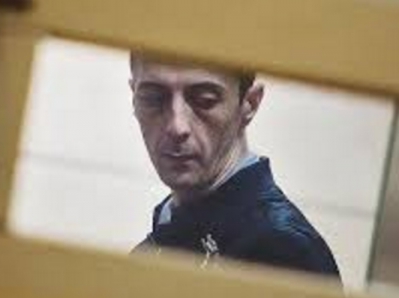Hostage to the End. Russia refuses to release Mustafa Dzhemiliev’s Son

Russia is refusing to allow the Ukrainian consul to see Khaiser Dzhemiliev, the 33-year-old son of veteran Crimean Tatar leader Mustafa Dzhemiliev. It recently turned down his application for parole and clearly plans to hold him imprisoned as long as it can.
Khaiser’s lawyer Nikolai Polozov has just lodged an appeal against the refusal to grant parole. However neither he nor Khaiser’s family are in any doubt that the young man is being held hostage as a form of pressure on his father. The world-renowned Crimean Tatar leader who spent 15 years in Soviet labour camps is an implacable opponent of Russia’s occupation of his homeland. Russia banned him from entering Russian-occupied Crimea in April 2014. It has now also issued an arrest warrant against him on grotesque charges, effectively of trying to enter his homeland. As well as Russia’s imprisonment of Khaiser Dzhemiliev, there was also recently an attempt to take Mustafa Dzhemiliev’s grandson, Erol Abdulzhelilov away « for a talk » (see: Russian occupiers come for Mustafa Dzhemiliev’s grandson).
Khaiser Dzhemiliev was not at the parole hearing. Through video link from the prison he stated that he had been held in a punishment cell for around 4 months. He said that he had been penalized for falling asleep during daylight hours and for ‘disrespect’. He did not agree with the punishment, but had not appealed as he did not know how. The prison administration said that he had received 7 punishments. They gave no details, only vague words about not wanting to reform, infringing order and being a bad influence on other prisoners.
Such penalties would enable punitive measures against Mustafa Dzhemiliev’s son, and also give an excuse for refusing parole. Polozov has said that they will be appealing against Thursday’s ruling, but he has no particular illusions as to the chances of success. If all appeals fail, then the young Dzhemiliev should be released in November this year.
On Feb 2 this year the Memorial Human Rights Centre condemned Russia’s use of Mustafa Dzhemiliev’s son as a hostage and demanded that he be returned to Ukraine. They said that even in the context of the violations of international law linked with Russia’s annexation of Crimea, the fact that Khaiser Dzhemiliev was being held in a Russian prison was unprecedented. There were absolutely no grounds for the Russian authorities to be involved in the case of a Ukrainian national convicted of committing a crime against another Ukrainian in Crimea in 2013.
In January this year Russia formally rejected Ukraine’s application for Khaiser’s extradition, despite all legal grounds under bilateral agreements for returning the young man to Ukraine. He had been taken from Crimea to a Russian prison in Astrakhan a few months earlier, seemingly around the same time that his father initiated the Crimean Blockade. This was almost certainly a reprisal against his father and illegal even according to Russian legislation which stipulates that he should be imprisoned either according to his place of residence, Crimea, or in the Krasnodar region where the trial took place.
By late November Polozov reported that Khaiser had been twice placed in a punishment cell. Safinar Dzhemilieva explained that her son has to stand in a damp and unheated solitary cell all day and is only allowed to lie down at night. He gets only one meal a day – like in Soviet times, she said. It was hardly surprising therefore that out of physical emaciation and tiredness, he could have fallen asleep during the day, which is what the second period in a punishment cell was officially for.
In May 2013 Khaiser Dzhemiliev shot and killed Fevzi Edemov who was working as a guard to the family. All the evidence indicated that this was a tragic accident, and that the correct charge should be of manslaughter through careless use of firearms.
It was under Viktor Yanukovych’s presidency that attempts were first made to use the case against Khaiser to blackmail Mustafa Dzhemiliev by threatening to change the charge from manslaughter to murder. These attempts were continued by Russia following its annexation of Crimea.
In the meantime the Ukrainian authorities passed the case to the Kyiv prosecutor on the basis of the Ukrainian Law on the Occupied Territory. An application to reinstate the original manslaughter charges was allowed, and two Kyiv courts subsequently ruled that Khaiser should be released from custody.
Since these rulings were ignored, Mustafa Dzhemiliev approached the European Court of Human Rights, which on July 10, 2014, ordered Khaiser Dzhemiliev’s release. Instead of complying with the Court in Strasbourg, Russia moved the young Ukrainian to the Krasnodar region in Russia. It also tried to charge Khaiser with murder “out of hooligan motives”, as well as with stealing and keeping a weapon and ammunition.
A Ukrainian court passed sentence in April 2015, with Khaiser’s extradition then immediately demanded, yet ignored, despite all legal requirements under joint agreements being fulfilled.
There was a cheering moment at the end of May when a Russian jury rejected the charges of murder which Russian investigators had insisted on bringing. The jury found Khaiser Dzhemiliev guilty of manslaughter through carelessness and of illegal possession of a weapon, as had the Ukrainian court. It considered that he was worthy of leniency over the charge of possessing a firearm.
The prosecutor ignored this and demanded a 5 year sentence which the court obligingly provided. The Supreme Court, however, reduced this to 3.5 years.
A particular example of legal nihilism in this case, as in those of Oleg Sentsov, Oleksandr Kolchenko, Oleksandr Kostenko and other Ukrainian political prisoners held in Russian-occupied Crimea or Russia, is that Russia is claiming that the men ‘automatically’ became Russian nationals as a result of Russia’s invasion and occupation of Crimea.
All remain Ukrainian nationals whom Russia is legally obliged to return to Ukraine.





